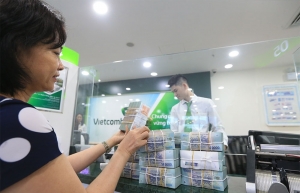The chance for real estate investment trusts to shine
The Vingroup-backed VMI Real Estate Investment and Management JSC (VMI) made headlines after its debut in October 2022. VMI stated its goals of enabling retail investors to make investment in real estate and manage properties, as well as developing the secondary market.
Of note, VMI unveiled its plan to invest in a certain amount of existing or future real estate products developed by Vinhomes, while the total real estate value would then be divided into 50 parts. Retail investors are likely to participate in partial investments through business cooperation contracts, and their property rights would be certified by VMI.
Analysts say the business model of VMI is similar to the form of joint property ownership that flourished several years ago and has been nurtured by the likes of Houze Invest, Infina, Moonka, and Sunshine Finance. In the light of joint property ownership, each retail investor can contribute capital from hundreds to thousands of USD for a subdivided real estate product.
 |
| The chance for real estate investment trusts to shine, illustration photo |
Investors will receive certificates in accordance with their capital contributions, while they can receive the principals and returns initially committed by real estate funds. They are even likely to be able to transfer such certificates to other investors.
The form of joint property ownership as announced by VMI or nurtured by some other funds is similar to the model of real estate investment trust fund (REIT) stipulated in the Law on Securities and the Ministry of Finance’s Circular No.98/2020/TT-BTC.
There are two main types of REITs: equity and mortgage. Equity REITs generate income through the collection of rent on, and from sales of, the properties they own for the long term; while mortgage ones invest in mortgages or mortgage securities tied to commercial and/or residential properties.
REITs are likely to pour capital into assets such as offices, industrial real estate, retail properties, residential properties, hotels, resorts, data centres, and infrastructure projects. The prices of such fund certificates are said to be less volatile than those of individual stocks, as REITs own a diversified portfolio of assets.
However, those provided by REITs in Vietnam are not quite as popular as other related products. The local securities market has only one REIT member, Techcom Vietnam REIT Fund.
Experts claim that regulations on real estate investment funds have been in effect for years but the model has not flourished, primarily due to the low profit margin distributed to investors.
In the United States, the United Kingdom, and Japan, 90 per cent of the REIT-paid profits distributed to investors is exempt from income tax and is also deducted from the funds’ taxable expenses. The UK, in particular, stipulates that income from domestic property rentals is not included in the funds’ corporate income tax payment.
Vietnam has yet to prescribe any regulations on similar incentives dedicated to REITs. Once making real estate transactions, they have to pay 20 per cent on income from their real estate transfer, the same tax rate applied to other companies.
Similarly, they have to pay 20 per cent of income difference from their investment in securities like what other companies do. Additionally, institutional investors that transfer REIT certificates must pay the tax rate of 20 per cent of the profits generated, while individuals pay 0.1 per cent of the selling value.
The Time is ripe
The slow growth of Vietnam’s REITs was anticipated by foreign investors as an additional opportunity to penetrate more deeply into the market. Indeed, the majority of such funds operating in Vietnam are foreign-invested ones, such as Indochina Capital, VinaCapital, Saigon Asset Management, and Dragon Capital.
Each REIT has its own development strategy, but their top-list portfolios normally focus on apartments, hotels and resorts, and retail real estate. The foreign-backed ones rely on obtaining foreign funding to engage in the Vietnamese real estate sector before going public on foreign exchanges.
Hence, the debut of VMI came into the spotlight as it is believed it can attract more attention from domestic investors to REITs, thus adding liquidity to the market.
“The launch of new real estate investment funds by large groups has given impetus to the real estate market amid the tighter control of capital flows into the market. This model would help to add new value and uphold the potential of the real estate market as well as satisfy the needs for making small investments in real estate,” said Pham Lam, founder of Houze Group.
Now, the development of new financial products like REIT fund certificates is required to ease current pressures on commercial banks and bond issuance channels as credit has served as the largest source of capital for real estate projects for decades, apart from developers’ own capital.
In fact, a number of developers shifted their attention to issuing corporate bonds in the past few years amid the tighter control of credit into real state, but bond issuance has so far fallen into hardship.
Advocating the form of joint property ownership aimed to appeal to secondary investors, Le Hoang Chau, chairman of the Ho Chi Minh City Real Estate Association, said that if legal and technological elements related to the model are ensured, it is likely to bring about more flexible opportunities to lure investment flows into the real estate market.
“The shared property ownership model should be developed towards the securitisation of real estate products. Attempts should be made to tokenise the value of properties with blockchain technology and use the tokens to raise capital,” Chau said.
Thus, real estate developers and funds will reach customers more easily and can sell tokens to raise funds for project development. “Coding assets by securitisation would enable developers to mobilise additional capital to complete the project construction, instead of concerns about commercial loan repayment deadlines,” he added.
Despite the REIT model’s potential as a lucrative investment channel, there are still several obstacles preventing its expansion. REITs and other related financial vehicles still lack a proper legal structure, as how to safeguard the interests of investors and guarantee information transparency remains vague.
In order to diversify financing channels and ease pressures on credit and bond issuance channels, tax incentives should be designed for REITs with the hope of developing it into an effective investment channel to attract social resources for the real estate market, according to Chau.
At the same time, strict control and supervision are also needed to avoid disguised forms of joint property ownership that might cause adverse consequences for the market.
 | Fresh trends to accumulate property in 2023 Investment trends could be shifting to the longer term to earn profits within the next 3-5 years, instead of more speculative investments. Trang Le, head of Research and Consulting at JLL Vietnam, told Hai Yen about accumulating real estate assets in 2023. |
 | Pinpointing the bottom of the market Like securities, the real estate market has experienced volatility, with cash flow remaining the greatest problem going into 2023. |
 | Real estate investors ponder where to place their money During a real estate market downturn, investors need to have a good grip on market movement and a clear vision in order to make prudent choices. |
What the stars mean:
★ Poor ★ ★ Promising ★★★ Good ★★★★ Very good ★★★★★ Exceptional
Related Contents
Latest News
More News
- Saigon Centre gains LEED platinum and gold certifications (February 12, 2026 | 16:37)
- Construction firms poised for growth on public investment and capital market support (February 11, 2026 | 11:38)
- Mitsubishi acquires Thuan An 1 residential development from PDR (February 09, 2026 | 08:00)
- Frasers Property and GELEX Infrastructure propose new joint venture (February 07, 2026 | 15:00)
- Sun Group led consortium selected as investor for new urban area (February 06, 2026 | 15:20)
- Vietnam breaks into Top 10 countries and regions for LEED outside the US (February 05, 2026 | 17:56)
- Fairmont opens first Vietnam property in Hanoi (February 04, 2026 | 16:09)
- Real estate investment trusts pivotal for long-term success (February 02, 2026 | 11:09)
- Dong Nai experiences shifting expectations and new industrial cycle (January 28, 2026 | 09:00)
- An Phat 5 Industrial Park targets ESG-driven investors in Hai Phong (January 26, 2026 | 08:30)

 Tag:
Tag:



















 Mobile Version
Mobile Version